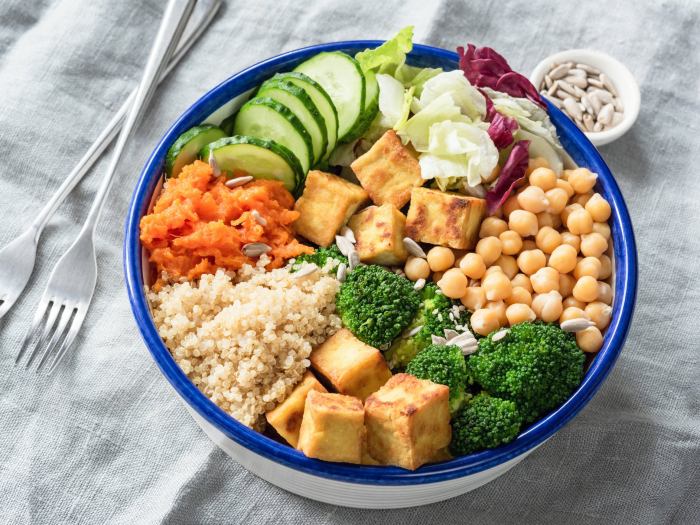Vegetarian diet and health – Vegetarianism, a dietary choice rooted in ethical, environmental, and health-conscious motives, has gained widespread attention. Delve into the realm of vegetarian diets, exploring their profound impact on our well-being, nutrient considerations, environmental implications, and social aspects. Discover the transformative power of plant-based nutrition as we unravel the intricate relationship between vegetarianism and health.
From reduced risks of chronic diseases to enhanced weight management and overall vitality, the health benefits of vegetarian diets are undeniable. However, understanding the potential nutrient deficiencies and devising strategies to obtain essential nutrients like protein, iron, and vitamin B12 is crucial for long-term well-being.
Vegetarian Diet and Health Benefits

Embracing a vegetarian diet offers numerous health benefits, supported by extensive scientific evidence. Vegetarian diets, which exclude meat, poultry, and seafood, are associated with a reduced risk of chronic diseases, improved weight management, and enhanced overall well-being.
If you’re looking to adopt a more plant-based diet but aren’t ready to give up animal products entirely, lacto ovo pesco vegetarian may be the right choice for you. This type of vegetarianism allows for the consumption of dairy, eggs, and fish in addition to plant-based foods.
Reduced Risk of Chronic Diseases, Vegetarian diet and health
Studies have consistently shown that vegetarians have a lower risk of developing chronic diseases, including:
- Cardiovascular disease:Vegetarian diets are rich in fiber, antioxidants, and plant sterols, which have been linked to reduced cholesterol levels and improved heart health.
- Type 2 diabetes:Vegetarian diets are low in saturated fat and high in fiber, which helps regulate blood sugar levels and reduce the risk of developing type 2 diabetes.
- Certain types of cancer:Vegetarian diets are associated with a reduced risk of certain types of cancer, such as colon, prostate, and lung cancer. This is attributed to the high intake of fruits, vegetables, and whole grains, which contain protective phytochemicals and antioxidants.
Positive Impact on Weight Management
Vegetarian diets are generally lower in calories and fat than non-vegetarian diets. They are also rich in fiber, which promotes satiety and helps reduce overall calorie intake. Studies have shown that vegetarians tend to have lower body mass indexes (BMIs) and are less likely to be overweight or obese.
For those seeking a balanced and ethical diet, lacto ovo pesco vegetarian offers a comprehensive approach that excludes meat, poultry, and fish, while allowing for dairy products, eggs, and seafood. This dietary choice promotes overall health, reduces environmental impact, and aligns with ethical concerns for animal welfare.
Improved Overall Well-being
Vegetarian diets provide an abundance of vitamins, minerals, and antioxidants, which contribute to overall well-being. Vegetarian diets have been linked to:
- Increased energy levels:Vegetarian diets are rich in complex carbohydrates, which provide sustained energy throughout the day.
- Improved digestion:Vegetarian diets are high in fiber, which promotes regular bowel movements and reduces the risk of constipation.
- Reduced inflammation:Vegetarian diets are rich in antioxidants and anti-inflammatory compounds, which can help reduce chronic inflammation throughout the body.
Vegetarian Diet and Nutrient Considerations
A vegetarian diet, while offering numerous health benefits, may pose certain nutrient considerations. Understanding these potential deficiencies and adopting strategies to address them is crucial for maintaining optimal health.
Essential nutrients like protein, iron, and vitamin B12 require particular attention in a vegetarian diet. Protein, vital for building and repairing tissues, can be obtained from plant-based sources such as beans, lentils, tofu, and tempeh. Iron, necessary for oxygen transport, is found in leafy green vegetables, fortified cereals, and beans.
Vitamin B12, essential for nerve function, is primarily found in animal products; vegetarians should consider fortified foods or supplements to ensure adequate intake.
Importance of Professional Guidance
Consulting with a healthcare professional is highly recommended for personalized dietary advice. A registered dietitian or doctor can assess individual nutrient needs, provide tailored recommendations, and monitor progress to ensure a balanced and nutritious vegetarian diet.
Types of Vegetarian Diets

Vegetarian diets encompass a wide range of eating patterns that exclude meat, poultry, fish, and seafood. Within the vegetarian spectrum, there are various subcategories, each with its unique nutritional considerations and benefits.
The main types of vegetarian diets include:
Lacto-Vegetarian Diet
Lacto-vegetarians consume dairy products, such as milk, yogurt, and cheese, along with plant-based foods. This diet provides a good source of calcium, protein, and vitamin B12, which is typically found in animal products.
Food sources:
- Fruits and vegetables
- Legumes (beans, lentils, chickpeas)
- Whole grains
- Dairy products (milk, yogurt, cheese)
- Eggs (if lacto-ovo vegetarian)
Ovo-Vegetarian Diet
Ovo-vegetarians include eggs in their diet, along with plant-based foods. This diet provides a good source of protein, choline, and vitamin B12. Choline is an essential nutrient for brain and nervous system health.
Food sources:
- Fruits and vegetables
- Legumes (beans, lentils, chickpeas)
- Whole grains
- Eggs
- Dairy products (if lacto-ovo vegetarian)
Vegetarian Diet and Environmental Impact: Vegetarian Diet And Health
Adopting a vegetarian diet offers significant environmental benefits. By reducing meat consumption, individuals contribute to lower greenhouse gas emissions and water conservation, promoting a more sustainable planet.
Greenhouse Gas Emissions
Livestock production is a major contributor to greenhouse gas emissions, particularly methane and nitrous oxide. Methane, a potent greenhouse gas with a warming potential 25 times greater than carbon dioxide, is released by cattle during digestion. Nitrous oxide, another potent greenhouse gas, is emitted from manure management and synthetic fertilizers used in animal feed production.
- A study by the University of Oxford found that a vegan diet produces 50% lower greenhouse gas emissions than a meat-based diet.
- Another study published in the journal Nature Climate Change estimated that transitioning to a plant-based diet globally could reduce food-related greenhouse gas emissions by up to 80%.
Water Conservation
Animal agriculture requires vast amounts of water for irrigation of crops used as feed, as well as for cleaning and processing. In water-scarce regions, this can put a strain on water resources.
- Producing one pound of beef requires approximately 1,800 gallons of water, while producing one pound of lentils requires only 12 gallons.
- A study by the Water Footprint Network found that a vegetarian diet uses 50% less water than a meat-based diet.
By adopting a vegetarian diet, individuals can significantly reduce their environmental impact, contributing to a more sustainable future.
Vegetarian Diet and Social Considerations

Vegetarianism is not just a dietary choice but also a social and cultural phenomenon. Adopting a vegetarian diet can have a profound impact on one’s social interactions and lifestyle. This section explores the social and cultural aspects of vegetarianism, discussing the challenges and opportunities of adopting a vegetarian diet in different social settings.
Navigating Social Situations as a Vegetarian
Social gatherings often revolve around food, which can present challenges for vegetarians. Attending events where meat-based dishes are the norm can be uncomfortable, especially for those who are new to vegetarianism. However, with a bit of preparation and assertiveness, vegetarians can navigate social situations gracefully.
- Communicate Your Dietary Preferences:Inform hosts or organizers about your vegetarianism in advance, allowing them to make appropriate arrangements.
- Bring Your Own Food:If you’re unsure about the food options available, consider bringing your own vegetarian dishes to share or have as a backup.
- Be Assertive but Polite:Politely decline meat-based dishes and ask for vegetarian alternatives.
Don’t be afraid to request specific dishes or modifications.
- Educate Others:Share your reasons for being vegetarian with others, fostering understanding and respect for your dietary choices.
Vegetarian Diet and Meal Planning
Meal planning for a vegetarian diet requires careful consideration to ensure adequate nutrient intake and a satisfying dining experience. Here are practical tips and sample meal plans to help you create balanced and enjoyable vegetarian meals.
Sample Meal Plans
To provide a well-rounded vegetarian diet, consider these sample meal plans that cater to different dietary preferences:
- Vegan Meal Plan:Emphasizes plant-based foods, excluding all animal products. Sample meals include tofu scramble for breakfast, lentil soup for lunch, and stir-fried vegetables with brown rice for dinner.
- Lacto-Vegetarian Meal Plan:Includes dairy products along with plant-based foods. Sample meals include oatmeal with yogurt and berries for breakfast, vegetarian chili for lunch, and pasta with marinara sauce and vegetables for dinner.
- Ovo-Vegetarian Meal Plan:Incorporates eggs in addition to plant-based foods. Sample meals include egg and vegetable breakfast burritos, black bean tacos for lunch, and vegetable stir-fry with rice for dinner.
- Lacto-Ovo Vegetarian Meal Plan:Includes both dairy products and eggs along with plant-based foods. Sample meals include yogurt parfaits with fruit for breakfast, vegetarian lasagna for lunch, and vegetable curry with quinoa for dinner.
Final Summary
As we conclude our exploration of vegetarian diets and health, it becomes evident that this dietary choice offers a multitude of benefits. Vegetarianism not only promotes individual health but also contributes to environmental sustainability and fosters social inclusivity. Whether driven by ethical concerns, environmental awareness, or health aspirations, embracing a vegetarian lifestyle empowers individuals to make conscious choices that positively impact their well-being and the planet.
Expert Answers
Is a vegetarian diet suitable for all individuals?
While vegetarian diets offer numerous health benefits, consulting with a healthcare professional is essential to determine the most appropriate dietary approach based on individual health needs and circumstances.
How can vegetarians ensure adequate protein intake?
Vegetarian diets provide ample protein sources, including legumes, lentils, tofu, tempeh, nuts, and seeds. Combining these protein-rich foods throughout the day helps meet daily protein requirements.
Is vitamin B12 deficiency a concern for vegetarians?
Vitamin B12 is primarily found in animal products. Vegetarians should consume fortified foods or consider vitamin B12 supplements to prevent deficiency.